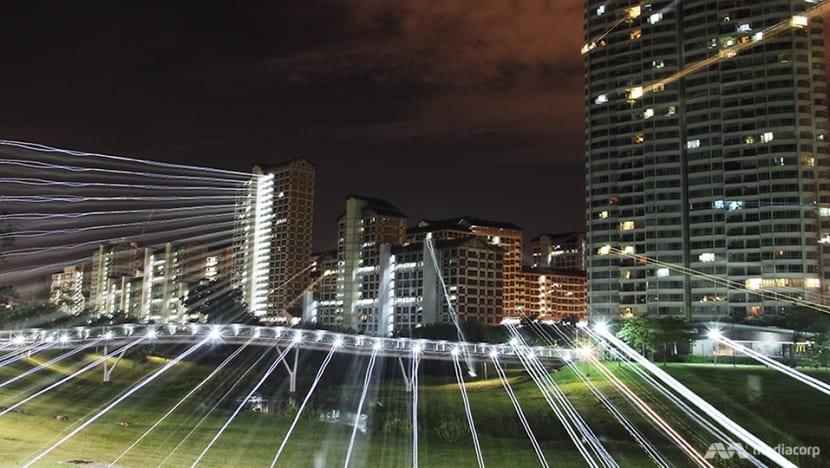Earlier measures have ensured energy supply and stabilised wholesale electricity prices: MTI

Bishan Park at night. (Photo: CNA/Marcus Mark Ramos)
SINGAPORE: Measures taken by the authorities so far have helped to ensure uninterrupted energy supply and stabilised wholesale electricity prices here, said Second Minister for Trade and Industry Tan See Leng in Parliament on Tuesday (Aug 2).
This means there is no need to bring the electricity market under state control within the short to medium term, he added in response to a parliamentary question.
The measures include setting up standby fuel facilities which generation companies, or gencos, can draw from to generate electricity when their natural gas supplies are disrupted. Authorities also required gencos to bolster their own stockpile of fuel.
Dr Tan noted that the world has been facing an energy crunch since last September, with global gas prices increasing significantly.
Global energy markets are set to remain “volatile and elevated”, given the protracted conflict in Ukraine and a seasonal increase in energy demand from countries during the upcoming winter.
As Singapore relies on imported natural gas to generate around 95 per cent of its electricity, domestic energy prices would not be spared from volatility in global markets, Dr Tan said.
“The higher fuel prices globally will result in higher domestic electricity prices,” he added.
“While our electricity prices will have to reflect the higher cost of electricity production, it is vital that the global volatility does not disrupt our electricity supply and impair the functioning of our domestic energy market.”
Dr Tan said the Energy Market Authority (EMA) will continue to monitor the situation closely and “will not hesitate to introduce new measures if necessary”.
Asked by MP Yip Hon Weng (PAP-Yio Chu Kang) if there are considerations to diversify Singapore’s electricity sources, the minister reiterated that the Government has been actively looking at ways to diversify and preserve the country’s energy security.
Other than the Lao PDR-Thailand-Malaysia-Singapore Power Integration Project, EMA has an ongoing request for proposal to import up to four gigawatts of electricity by 2035.
“EMA has received various proposals from countries in the region and beyond, demonstrating the abundant renewable energy potential within this region,” said Dr Tan.
“We welcome these proposals, and we will diversify our supply sources to secure a reliable and sustainable supply for Singapore.”
Apart from electricity imports, the country will also continue to actively preserve some of its existing energy suppliers, while exploring other energy sources such as solar energy and low-carbon alternatives like hydrogen.
Authorities have also been rolling out support measures for businesses and households, Trade and Industry Minister Gan Kim Yong said in a written parliamentary answer on Monday.
For instance, the Temporary Electricity Contracting Support (TRECS) scheme helps large consumers secure retail electricity contracts. This was recently extended to end-March 2023.
Mr Gan noted that demand for TRECS has been “steadily decreasing”, indicating that businesses are now able to secure longer-term retail contracts.
A new Energy Efficient Grant was also announced last month as part of a S$1.5 billion support package to counter rising inflation here. This grant is targeted at small- and medium-sized enterprises that are energy-intensive, such as those in the food services, food manufacturing and retail industries.
The Government will also continue to help consumers cope with higher electricity prices, especially the more vulnerable groups.
For example, as part of support measures announced in Budget 2022, the amount of GST Voucher (GSTV) U-Save vouchers for eligible households has doubled this financial year from last year.
These quarterly rebates add up to eight to 10 months’ worth of utility bills for the average household in one- and two-room HDB flats, and about four to six months for those living in three- to four-room flats.
Meanwhile, all Singaporean households will receive an additional S$100 of household utilities credit by September as part of the S$1.5 billion support package announced last month.
The Government will “do all it can” to ensure resilience in the country’s electricity supply, Mr Gan said, as he urged consumers to also do their part by conserving energy where they can.














